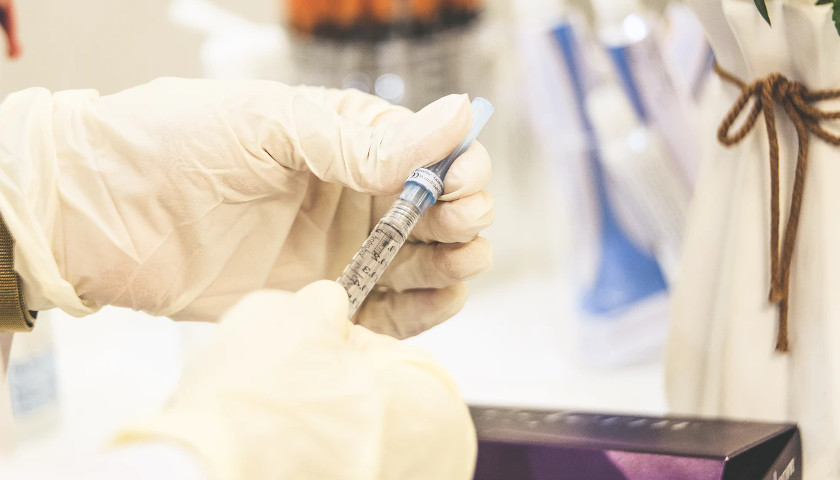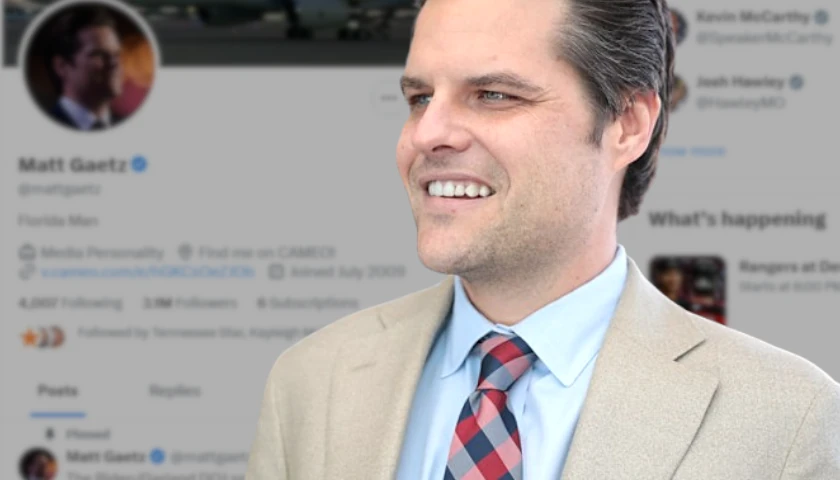by Julie Kelly
It took a Mexican comedian to do the job the American news media refuses to do.
During a series of pointed questions, Dr. Anthony Fauci admitted the COVID-19 vaccines won’t stop people from contracting the virus; the shots only lessen the symptoms if a recipient is later infected with SARS-CoV-2.
“There’s a 95 percent chance you will not get a symptomatic infection,” Fauci told Eugenio Derbez last week. “We are unsure right now what the protection is against infection because it’s conceivable you could get vaccinated, get exposed, get infected, not know it . . . but you could have virus in your nasal pharynx.”
Fauci continued spinning. Since no one knows whether the vaccine prevents transmission, Fauci warned, even vaccinated people must wear a mask if “they’re around people who are vulnerable to infection.” It will be at least a few more months before researchers know for certain the risk level of a vaccinated person infecting someone else, Fauci said.
Derbez clearly made the deified public health expert—you can now buy a t-shirt telling the world you received your “Fauci ouchie,” referring to the vaccine—squirm. Accustomed to softball interviews by swooning American journalists, Fauci was unprepared to face tough questions.
But his responses exposed the confusing, and frankly unconvincing, promotional campaign for COVID-19 vaccines. Americans generally understand vaccines to be a safeguard against getting a harmful virus, not an immunity booster to make the resultant disease more manageable. This is especially true of a highly contagious virus that can be lethal to the elderly, obese, or immuno-compromised. No one expected the vaccine merely would act as an injectable version of DayQuil or a vitamin pack but with unknown side effects.
Legitimate Questions
After a year of hyperbolic fear-mongering and warning life only could “return to normal” after widespread immunizations, the COVID chicken hawks are finally coming home to roost. Questions abound.
How will “normalcy” return when someone can still contract and transmit the virus after vaccination? What’s the point of getting the shots if you, and everyone else, must still wear a mask? If mask-wearing and social distancing must continue until we have more solid answers about vaccine efficacy, why not delay the program until more is known? If getting the vaccine doesn’t protect my family or neighbor, why bother? What about stories and data showing moderate to severe side effects, which in some cases are more debilitating than the disease itself?
Unfortunately, those rational inquiries apparently make you a dreaded “anti-vaxxer.” Americans are instructed not to doubt anything coming from the very same authorities who’ve been wrong on everything since the start of the pandemic. Suspicions are silenced rather than honestly addressed. And it all looks very familiar.
Twitter, which already censors content on face masks and hydroxychloroquine that dares to contradict approved groupthink, will flag posts as containing “misleading information” on vaccines; repeat offenders could be deplatformed. Joe Biden blamed Donald Trump and “MAGA folks” for stoking distrust; he also suggested people who don’t take the vaccine are unpatriotic. “Protect other people,” Biden demanded in a recent interview.
Vaccine shaming is the new mask shaming.
But Americans are justified in their hesitancy. The credentialed class burned its collective reputation over the past year and their dismissive, “nothing to see here, folks” retort to valid concerns about a rushed vaccine seems to be backfiring.
The politicized nature of the roll-out, at least by Pfizer, did little to inspire confidence from the start. The company, as I reported in November, slow-walked releasing results of its successful phase three study until after Election Day even though Pfizer’s CEO had publicly promised it would be done by late October. A top Pfizer executive then insisted it had not participated in Trump’s Operation Warp Speed, a claim the company later rescinded.
Even worse, health officials notified the Biden campaign before it informed the White House about the vaccine’s success. “As I have long said, Pfizer and the others would only announce a Vaccine after the Election, because they didn’t have the courage to do it before,” Trump tweeted November 9 after Biden, not the White House, got first dibs on telling the good news to the American public the day after media outlets declared he officially won the presidency. Politics clearly was at work.
So, too, is profit. In a recent teleconference call, Pzifer executives disclosed to investors the need to produce a third dose of the current vaccine in addition to annual booster shots. “As we move from a pandemic . . . situation to an endemic situation…we view that as a significant opportunity for our vaccine from a demand perspective, from a pricing perspective,” Pfizer CFO Frank D’Amelio told bankers on March 11.
No kidding. The company projects an impressive 41 percent jump in revenue in 2021 thanks to COVID-related earnings. Without COVID, D’Amelio revealed, “the top line next year is growing operationally 6 percent. So from my perspective, we’ve got a nice operational rhythm going relative to the operational performance of the business.”
Pfizer also doesn’t have to worry about dishing out millions in damages if something goes wrong; in 2020, the Department of Health and Human Services gave the corporations liability immunity “against any claim of loss caused by, arising out of, relating to, or resulting from the manufacture, distribution, administration, or use of medical countermeasures,” including vaccines. That sweet gift keeps giving until 2024.
No Benefit of the Doubt
Further, government authorities do not deserve an ounce of Americans’ benefit of the doubt. The latest phase of vaccine bullying comes on the one-year anniversary of “15 days to slow the spread,” the most disastrous scientific policy in modern U.S. history and Donald Trump’s most disastrous political move by far. After instructing Americans to stay six feet apart for the past year, the Centers for Disease Control is expected this week to downshift to three feet apart for school reopenings. It’s only a matter of time until the “experts” ditch pseudoscientific “social distancing” altogether.
So assurances from federal health agencies that COVID vaccines are “safe and effective” shouldn’t be taken at face value. The bottom line is these vaccines are experimental. This is the first time mRNA vaccines have been administered to the general public—only about 75,000 people were involved in trials conducted by both Pfizer and Moderna, or .0002 percent of the U.S. population.
The shots do not have FDA approval; the agency issued an emergency use authorization (EUA) in December. “The abbreviated timelines for the emergency use applications and authorizations means there is much the FDA does not know about these products even as it authorizes them for emergency use, including their effectiveness against asymptomatic infection, death, and transmission of SARS-CoV-2, the virus that causes the disease,” STAT News reported this week. Final FDA licensing might take two years.
Meanwhile, concerns about side effects are growing. Between December 2020 and this week, according to the HHS agency responsible for tracking severe reactions to immunizations, 1,913 people have died post-vaccine. Common side effects—especially after the second dose—include fever, headaches, severe fatigue, pain at the injection site, chills, and joint pain. A new study indicates another rare outcome is anaphylaxis, a potentially fatal allergic reaction.
Worries over severe side effects, according to a new poll, are the top reason why people are wary about taking the vaccine. Another concern is the way the vaccine was fast-tracked. Those fears won’t go away no matter how much name-calling Joe Biden spews at Republicans.
Ironically, the person most responsible for the mixed messaging about the vaccine is none other than Fauci himself. Senator Rand Paul (R-Ky.) mocked Fauci for double-masking during his Senate testimony on Thursday. “You’ve had the vaccine and you’re wearing two masks, isn’t that theater?” Paul asked Fauci, who pivoted to warnings about scary “variants” of the virus. “You want to get rid of vaccine hesitancy, tell ‘em they can get rid of their mask after they get the vaccine!” Paul said.
If politicians and public health authorities want someone to blame for people’s reluctance to get a vaccine, they should take a long look in the mirror.
– – –
Julie Kelly is a political commentator and senior contributor to American Greatness. She is the author of Disloyal Opposition: How the NeverTrump Right Tried―And Failed―To Take Down the President. Her past work can be found at The Federalist and National Review. She also has been featured in the Wall Street Journal, The Hill, Chicago Tribune, Forbes, and Genetic Literacy Project. After college graduation, she served as a policy and communications consultant for several Republican candidates and elected officials in suburban Chicago. She also volunteered for her local GOP organization. After staying home for more than 10 years to raise her two daughters, Julie began teaching cooking classes out of her home. She then started writing about food policy, agriculture, and biotechnology, as well as climate change and other scientific issues. She graduated from Eastern Illinois University in 1990 with a degree in communications and minor degrees in political science and journalism. Julie lives in suburban Chicago with her husband, two daughters, and (unfortunately) three dogs.





